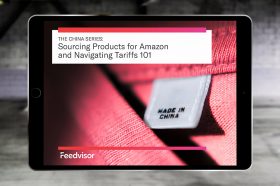Resources - Blog
How to Find a Manufacturer for Your Amazon Private Label Products

Stay on top of the latest e-commerce and marketplace trends.
How to Find the Right Manufacturers for Your Amazon Private Label Store
Arguably the most critical component of adding private label products to your Amazon catalog is finding an experienced, reliable manufacturer that will supply you with high-quality goods and regularly add value to the partnership. In this guide, we discuss how you can identify and establish productive relationships with dependable manufacturers that can bring your brand vision and private label concept to life. Sourcing the right manufacturer is essentially laying the groundwork for your future brand-building opportunities. If the initial product performs well and you are pleased with the end result, chances are high that you will use the same manufacturer for additional private label products in the future. Therefore, it is critical that you do your due diligence and thoroughly vet any potential manufacturers from the get-go in order to mitigate the risk of any issues once you have placed a bulk order and signed a contract. Risks that you should be cognizant of when finding a manufacturer include the following:
- Quality assurance (QA) roadblocks: Any product that you private label will be a reflection of your brand, as well as your reputation as a seller. With that being said, you need to perform quality checks and make sure you are pleased with the samples and prototypes before placing a bulk order with a manufacturer for production.
- Reliability: Is the manufacturer experienced? Has the company been in business for a satisfactory length of time? Do they have a specific product focus that aligns with your product idea? What is their production lead time and can they provide you with proof that they always stick to their timeframes? All of these questions indicate the need to make sure the manufacturer you find is seasoned and true to his or her word.
- Legal issues: Given that the final product will have your brand name on it makes you liable for any potential legal problems that can arise. Educate yourself on intellectual property standards — including trademark and patent risks — as well as any safety risks involved when selling in certain Amazon product categories. For example, if you are going to be sourcing dietary supplements from this manufacturer, be sure to adhere to Amazon’s compliance requirements for packaging and labeling.
6 Traits to Look For When Evaluating Private Label Manufacturers
We will discuss how and where to find private label manufacturers later in the piece, but here are several characteristics your manufacturers must have that will lead to a mutually beneficial relationship. 1. Competitive Pricing Is the supplier willing to provide a pricing quote? Is there room for negotiation? Is their pricing affordable and will it allow you to resell on Amazon at a competitive price? Negotiating a good price from the manufacturer will allow you to increase your profit margins once the product has moved through the supply chain to be sold on Amazon. You can request quotes from multiple suppliers to determine if the pricing you are actually receiving will be competitive in the market. Be sure to also ask about any minimum order quantities, additional pricing for iterations of samples, and any shipping or transportation costs. 2. Experience in Your Product Niche Be sure the manufacturers you are considering have experience private labeling products as well as making products in your specific product category or niche. Ask to see images of the exact products they have produced as well as tangible product examples to confirm their legitimacy. Confirm the colors, sizes, styles, and any other relevant specs in which they can make the product, as well as if they have the capability to accommodate any modifications you are seeking. 3. High-Quality Products Product quality is a legitimate concern when working with a new manufacturer, so once you have identified this supplier and before you establish a partnership, be sure they can send samples so you can perform a quality check. In order to navigate any potential concerns with products of poor quality, requesting samples will allow you to verify a product’s look, feel, and quality before investing any money into inventory. Some sellers may even contact their supplier using another name and email to get an additional sample to compare quality and make sure the supplier did not just send a high-quality sample while the seller was meticulously vetting the product. Receiving samples will enable you to test the product, examine the specs in detail, and identify any changes that need to be made prior to the production run. 4. On-Time Delivery and Adherence to Lead Times Ask every manufacturer about their production lead time and history with on-time delivery. This will be especially relevant if you are working with a manufacturer overseas and you are working to receive products in time for a shopping event such as Amazon Prime Day or Black Friday. 5. A Low Product Defect Rate Inquire about the manufacturer’s defect rate and explore online reviews from other sellers who have partnered with the manufacturer. The Maker’s Row directory, for example, allows you to read up on the experiences that other members of the community have had in the past with individual manufacturers. 6. Flexibility to Establish Terms of Trade In order to extract the maximum value from each manufacturer, always ask about periodic, effective, and structured negotiations to ensure ongoing profitability and healthy performance metrics. Be vigilant and regularly check in with your supplier to ensure he or she remains honest and trustworthy. Ask them about any available discounts on pricing — which are known as Terms of Trade — to help you compensate for any defective product issues and ensure that you continue to benefit from your supplier as your business scales. Always have both parties sign a contract outlining any agreed upon terms and keep those documents available for quick reference.
Overseas vs. Domestic Manufacturers
In this section of the article, we outline the key differences between sourcing private label products in your native country versus overseas, such as from China or India. Advantages of domestic manufacturing:
- No language or cultural barriers
- High-quality production and labor standards
- If you reside in the U.S., there is a consumer demand for “Made in America” products
- Shorter lead time to your warehouse or Amazon FBA
- Increased levels of payment security
- Less time-consuming to verify reputable manufacturers
Disadvantages of domestic manufacturing:
- Higher manufacturing costs versus overseas
- Fewer products available, i.e. many items are no longer manufactured in North America
Advantages of overseas manufacturing:
- Low manufacturing costs versus domestically
- A vast pool of manufacturers to choose from
- Many online directories exist to help you identify vetted suppliers
Disadvantages of overseas manufacturing:
- Shopper perception of the product quality is lower
- Typically lower manufacturing and labor standards
- Less guaranteed intellectual property protection
- Have to navigate language and cultural differences
- The time-consuming process to verify reputable manufacturers
- Longer lead time
- Need to navigate importing nuances, customs clearances, and tariffs, if applicable
- Lower levels of payment security
Where to Find the Best Private Label Manufacturers
The two most popular ways to find private label manufacturers for your Amazon business are on the Internet or in person at trade shows. 1. Online Directories
JungleScout launched a Supplier Database to help you find legitimate, high-quality global manufacturers. While there is a cost associated with the tool, you can view suppliers’ customer volume and confirmed shipments to verify legitimacy.
With more than 8,000 pre-vetted local and global manufacturers, Salehoo allows you to connect with specific private label manufacturers for specific product niches. There is a flat annual or lifetime fee to access the directory.
Known for helping sellers and brands source products from China, Trillion Source works with more than 5,000 verified and certified manufacturing facilities.
With its Supplier Discovery tool, you can evaluate more than 500,000 U.S.-based custom manufacturers and filter by supplier qualifications, location, state, and quality certifications.
Maker’s Row has a network of 10,000 manufacturers and, across its network, has produced more than 2 million American-made products.
MFG refers to itself as “the world’s largest custom manufacturing marketplace” and provides access to thousands of manufacturers in its directory, lets you create custom RFQs, and matches you with manufacturers that can fulfill your unique needs.
Headquartered in Beijing, DHgate refers to itself as the largest B2B cross-border e-commerce trade platform in China and has more than 22 million products available across a variety of product categories.
Another Chinese-based manufacturer company, Global Sources is based in Hong Kong and facilitates trade between Asia and the world through its online supplier marketplace, trade shows, magazines, and apps. 2. Alibaba While Alibaba is an extremely commonly used website for finding private label manufacturers, it is critical that you trade exclusively with vetted gold suppliers, the company’s premium suppliers who are required to pass an onsite check before being verified. Doing so will help you ensure security and avoid scams or counterfeit suppliers. You can also leverage Alibaba’s trade assurance program, which mitigates risk by guaranteeing money back in the event of a supplier issue such as delays, quality and quantity discrepancies, or other processing problems. 3. Reddit A search on Reddit for private label manufacturers will yield threads that include manufacturer recommendations for specific verticals, locations, or even specific products. 4. A Google Search If you want to cast a wide net, starting with a Google search will generate a vast variety of results that you may have to sift and filter through to find exactly what you are looking for, but if you have the time to do so, you can find manufacturers based on your product category and niche. For example, you can search “cosmetics private label manufacturers,” “cosmetics private label manufacturer,” or “U.S. cosmetics private label manufacturer,” depending on what exactly you are looking for. Google is a particularly helpful resource if you are looking for U.S.-based private label manufacturers for products that require specific health or safety compliance. 5. Trade Shows and Wholesale Markets If you would prefer to meet your potential manufacturers in a face-to-face scenario versus an online portal, you can travel to domestic or overseas trade shows or wholesale markets to establish an immediate personal connection. Some shows are “order-writing shows” meaning you can place orders with manufacturers on the exhibition floor at the show itself. Specifically, the Private Label Manufacturer’s Association (PLMA) can be a great resource for finding private label manufacturers. PLMA represents more than 4,500 member companies around the globe, provides services to manufacturers in more than 75 countries, and hosts several trade shows annually, most notably in Chicago and Amsterdam.
Final Thoughts
Sourcing private label products for your Amazon business allows you to maintain control throughout the entire process — from finding the right manufacturer to negotiating on pricing and creating your brand’s logo, design, and packaging. Vetting each prospective manufacturer and checking for reviews and verifications prior to engaging in a partnership will help ensure that your overall experience is productive and enables you to drive private label growth on Amazon.
Learn what Feedvisor can do for your business.
When you partner with Feedvisor, you automatically receive access to our true, AI-driven technology and hands-on team of e-commerce experts. Contact one of our team members today to learn more about our end-to-end solution for brands and large sellers on Amazon, Walmart, and e-marketplaces.



